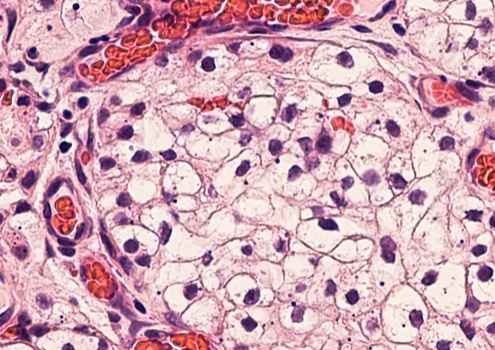Bristol-Myers Squibb and Exelixis Eye Potential Approval of RCC Combination Drug Following Positive Phase III Results
BMS and Exelixis Eye Potential Approval of RCC Combination Drug Following Positive Phase III Results
Bristol Myers Squibb and Exelixis are eying potential approval of a combination therapy for renal cell carcinoma following results from a late-stage study that showed a combination of Opdivo and Cabometyx met its primary endpoint of progression-free survival.
This morning, the two companies announced the positive topline results from the pivotal Phase III CheckMate -9ER study in previously untreated patients with renal cell carcinoma. The trial paired BMS’ checkpoint inhibitor Opdivo (nivolumab) with RCC drug Cabometix (cabozantinib) against Pfizer’s Sutent (sunitinib), an RCC drug approved more than 10 years ago. In addition to meeting the primary endpoint at the final analysis, the trial also met its secondary endpoints of overall survival (OS) and objective response rate at a pre-specified interim analysis, the companies jointly announced this morning.
Renal cell carcinoma is the most common type of kidney cancer in adults, accounting for more than 140,000 deaths worldwide each year. Globally, the five-year survival rate for those diagnosed with metastatic, or advanced, kidney cancer is about 12.1%, the companies said.
Cabometyx, which targets MET, AXL and VEGFR-1, -2 and -3, was approved to treat patients with advanced renal cell carcinoma in 2017. Last year, the medication was approved to treat hepatocellular carcinoma, the most common form of liver cancer. The safety profiles of Opdivo and Cabometyx remained consistent with the known safety profiles of the drugs.
Dr. Toni Choueiri, director of the Lank Center for Genitourinary Oncology at Dana-Farber Cancer Institute and a trial investigator, said the results from the pivotal CheckMate -9ER trial “clearly demonstrate” the combination therapy “provides a clinically meaningful benefit in the key efficacy measures of progression-free survival and overall survival for previously untreated kidney cancer patients.” If approved, Choueiri said the combination of Opdivo and Cabometix could become an important first-line option for patients with metastatic renal cell carcinoma.
Brian Lamon, development lead of genitourinary cancers at Bristol Myers Squibb, said the companies will begin working with regulatory agencies to develop a path for potential approval of the combination therapy, but did not provide a timeline. The companies plan to submit detailed results of CheckMate -9ER for presentation at an upcoming medical conference.
“We’re delighted that the trial met its primary endpoint of progression-free survival as well as the secondary endpoints of overall survival and objective response rate, demonstrating consistent benefit for the combination in previously untreated renal cell carcinoma patients. We look forward to our continued collaboration with Bristol Myers Squibb as we work toward regulatory filings in the near future,” Exelixis Chief Medical Officer Gisela Schwab said in a statement.
In addition to CheckMate -9ER, BMS also reported topline results from the pivotal Phase III CheckMate -743 trial evaluating Opdivo plus Yervoy in previously untreated malignant pleural mesothelioma. That study met its primary endpoint of overall survival compared to chemotherapy, BMS said. Malignant pleural mesothelioma is a devastating disease that has seen limited therapeutic advances over the past decade. Today’s result highlights the company’s commitment to reaching patients in areas of high unmet need and build upon the company’s growing presence in lung cancer. BMS said.
BioSpace source:


